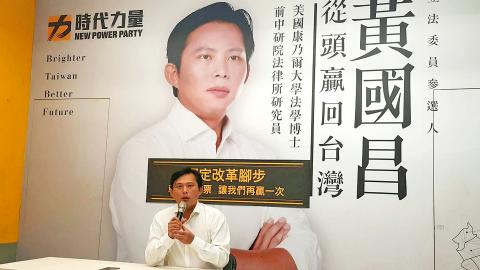Facing threats of a recall campaign that on Friday passed the second-phase threshold, New Power Party (NPP) Executive Chairman Huang Kuo-chang (黃國昌) yesterday said that he did not neglect his legislative duties and urged supporters of reform to vote for him again.
The campaign was initiated in May by the Greater Taipei Stability Power Alliance, a group that opposes same-sex marriage. The Central Election Commission approved the motion in June, after it confirmed the 2,637 signatures submitted by the group.
According to the Civil Servants Election and Recall Act (公職人員選舉罷免法), a recall campaign must obtain signatures from more than 10 percent of the eligible voter population in an official’s constituency to pass the second-phase threshold.

Photo: CNA
The New Taipei City Election Commission on Friday announced that it had received 26,745 signatures from voters in the city’s 12th electoral district, more than the required 25,119 signatures, although the validity of the signatures will need to be verified by the commission before the final result can be announced later this month.
Huang told a news conference at his office in the city’s Sijhih District (汐止) that since becoming a legislator last year, he and the NPP have gone all-out to defend the nation’s sovereignty, push marriage equality forward, carry out pension reform and investigate scandals involving abuses of privilege.
He said that he has always been conscientious about his duties and puts all his effort behind them, adding that he is confident that the voters in his constituency have seen his performance, and although some people might have been misguided by lies aimed at discrediting him, the truth does not fear contention.
His assessment as an “excellent lawmaker” several times by the legislative watchdog Citizen’s Congress Watch is recognition of his team’s hard work, Huang said, adding that he feels no guilt in saying that his performance can withstand the test.
“I really feel sorry for my family and thank them for their understanding and support,” Huang said.
“Through the process, I have profoundly felt that deep-rooted conservative power and influential officials are still everywhere in Taiwan, obstructing the nation from advancing,” he said.
“I deeply believe that reform will eventually win and sunrise will eventually dawn on the island,” Huang added, calling on his supporters to again join forces and vote in the upcoming recall election to support him and his belief in reform.
Asked whether he would consider running for New Taipei City mayor next year if he is recalled, Huang said: “As a legislator, my duty is to focus on preparing for questions at the Legislative Yuan.”
He said that he places strict demands on himself to be a responsible lawmaker, so he must personally research and draft every bill that he proposes.

CHANGING LANDSCAPE: Many of the part-time programs for educators were no longer needed, as many teachers obtain a graduate degree before joining the workforce, experts said Taiwanese universities this year canceled 86 programs, Ministry of Education data showed, with educators attributing the closures to the nation’s low birthrate as well as shifting trends. Fifty-three of the shuttered programs were part-time postgraduate degree programs, about 62 percent of the total, the most in the past five years, the data showed. National Taiwan Normal University (NTNU) discontinued the most part-time master’s programs, at 16: chemistry, life science, earth science, physics, fine arts, music, special education, health promotion and health education, educational psychology and counseling, education, design, Chinese as a second language, library and information sciences, mechatronics engineering, history, physical education

The Chinese military has boosted its capability to fight at a high tempo using the element of surprise and new technology, the Ministry of National Defense said in the Quadrennial Defense Review (QDR) published on Monday last week. The ministry highlighted Chinese People’s Liberation Army (PLA) developments showing significant changes in Beijing’s strategy for war on Taiwan. The PLA has made significant headway in building capabilities for all-weather, multi-domain intelligence, surveillance, operational control and a joint air-sea blockade against Taiwan’s lines of communication, it said. The PLA has also improved its capabilities in direct amphibious assault operations aimed at seizing strategically important beaches,

‘MALIGN PURPOSE’: Governments around the world conduct espionage operations, but China’s is different, as its ultimate goal is annexation, a think tank head said Taiwan is facing a growing existential threat from its own people spying for China, experts said, as the government seeks to toughen measures to stop Beijing’s infiltration efforts and deter Taiwanese turncoats. While Beijing and Taipei have been spying on each other for years, experts said that espionage posed a bigger threat to Taiwan due to the risk of a Chinese attack. Taiwan’s intelligence agency said China used “diverse channels and tactics” to infiltrate the nation’s military, government agencies and pro-China organizations. The main targets were retired and active members of the military, persuaded by money, blackmail or pro-China ideology to steal

The High Prosecutors’ Office yesterday withdrew an appeal against the acquittal of a former bank manager 22 years after his death, marking Taiwan’s first instance of prosecutors rendering posthumous justice to a wrongfully convicted defendant. Chu Ching-en (諸慶恩) — formerly a manager at the Taipei branch of BNP Paribas — was in 1999 accused by Weng Mao-chung (翁茂鍾), then-president of Chia Her Industrial Co, of forging a request for a fixed deposit of US$10 million by I-Hwa Industrial Co, a subsidiary of Chia Her, which was used as collateral. Chu was ruled not guilty in the first trial, but was found guilty